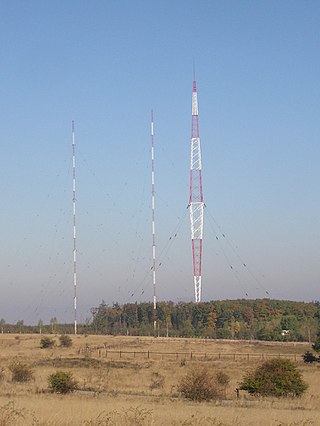Related Research Articles
Telecommunications in Botswana include newspapers, radio, television, fixed and mobile telephones, and the Internet.
Brazil has both modern technologies in the center-south portion, counting with LTE, 3G HSPA, DSL ISDB based Digital TV. Other areas of the country, particularly the North and Northeast regions, lack even basic analog PSTN telephone lines. This is a problem that the government is trying to solve by linking the liberation of new technologies such as WiMax and FTTH) only tied with compromises on extension of the service to less populated regions.

Telecommunications in Bulgaria include radio, television, fixed and mobile telephones, and the Internet.
Present-day telecommunications in Canada include telephone, radio, television, and internet usage. In the past, telecommunications included telegraphy available through Canadian Pacific and Canadian National.
Telecommunications in France are highly developed. France is served by an extensive system of automatic telephone exchanges connected by modern networks of fiber-optic cable, coaxial cable, microwave radio relay, and a domestic satellite system; cellular telephone service is widely available, expanding rapidly, and includes roaming service to foreign countries.
The most important telecommunications in Italy are telephone, radio, television and the Internet.
Telecommunications in Kuwait provides information about the telephone, Internet, radio, and television infrastructure in Kuwait.
Telecommunications in the Maldives is under the control and supervision of the Communications Authority of Maldives (CAM). The Maldives is served by three telecommunications operators, Dhiraagu, Ooredoo Maldives and Raajjé Online.

Mali, a large, landlocked, multicultural country in West Africa, consistently ranks low in the Human Development Index. The infrastructure of communications in Mali, while underdeveloped, is crucial to the nation.
Telephones - main lines in use: 300,500 (2024)

Mass media in Mexico are regulated by the Secretariat of Communication and Transportation, a federal executive cabinet ministry and by the Federal Telecommunications Institute.
The People's Republic of China possesses a diversified communications system that links all parts of the country by Internet, telephone, telegraph, radio, and television. The country is served by an extensive system of automatic telephone exchanges connected by modern networks of fiber-optic cable, coaxial cable, microwave radio relay, and a domestic satellite system; cellular telephone service is widely available, expanding rapidly, and includes roaming service to foreign countries. Fiber to the x infrastructure has been expanded rapidly in recent years.
Telecommunications in Peru include radio and television, fixed and mobile telephones, and the Internet.
Telecommunications in Spain is accomplished through the transmission of information by various types of technologies within Spain.
Communications in the United States Virgin Islands
Telecommunications in Bahrain are provided by the Bahrain Telecommunications Company, trading as Batelco, as well as other companies such as Zain and Stc Bahrain.
Telephones - main lines in use: 110,300 (2007)
country comparison to the world: 137
Telecommunications in Cuba consists mainly of NTSC analog television, analog radio, telephony, AMPS, D-AMPS, and GSM mobile telephony, and the Internet. Telephone service is provided through ETECSA, mobile telephone service is provided through the Cellular Telephone Company of Cuba (CUBACEL) and, previously, Caribbean Cellular. Cuba's main international telecommunications links are through Intersputnik, with limited effectiveness of undersea telephone cables to the Americas, Spain, and possibly Italy due to underdevelopment.
This article is about communications systems in Aruba.
Telecommunications in Djibouti falls under the authority of the Ministry of Communication & Culture.
References
- ↑ "Historia de la Compañía » Telefónica Chile" (in Spanish). Retrieved 2022-06-28.
- 1 2 3 4 5 6 7 "Chile". The World Factbook (2024 ed.). Central Intelligence Agency.
- 1 2 "Número de celulares en Chile superó los 24 millones". Acceso a internet por cada 100 habitantes llega a 41% y banda ancha móvil se acerca a los 5 millones de conexiones. Gobierno de Chile. Retrieved 2013-05-29.
- ↑ Compendio Estadístico 2006, INE.
- ↑ "What are the video format standards used in different countries worldwide?". Sony.com. November 4, 2018. Retrieved 30 October 2019.
- ↑ Articulo 2012, Cambio21.
- ↑ "Full list: Plug, socket & voltage by country". WorldStandards. 9 August 2022.

